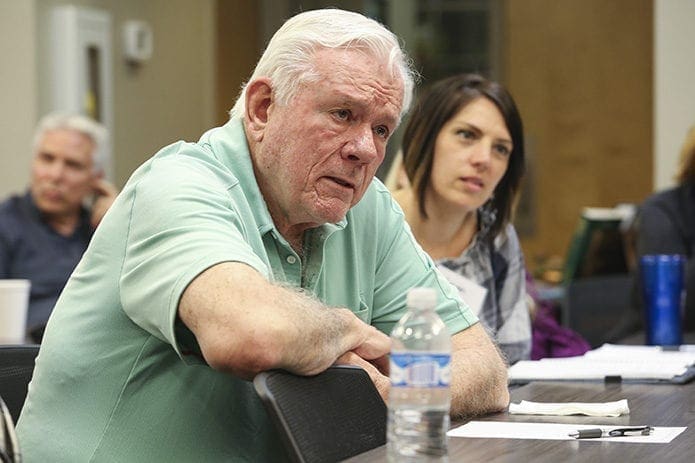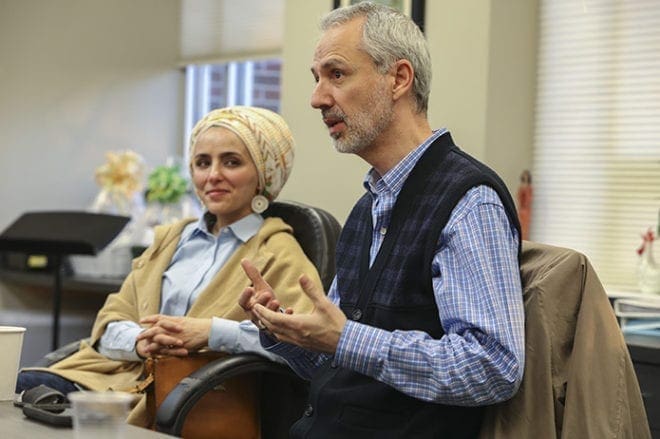 Photo By Michael Alexander
Photo By Michael AlexanderAtlanta
Children of Abraham explores ‘truth and holiness’ of all world religions
By MARK WOOLSEY, Special to the Bulletin | Published April 18, 2019
ATLANTA—Some serious construction work has been going on the past three months in a classroom at the Ignatius House Jesuit Retreat Center—namely building bridges to knowledge and in the process, tearing down walls of misunderstanding. Put a gifted teacher together with mature, intellectually curious students and watch the intellectual dirt fly.
For 13 weeks ending April 10, 28 students took part in an innovative class called “The Children of Abraham”—so named because it was a thorough study of Christianity, Islam and the Jewish faiths, which all trace their origins to the biblical patriarch.
The group—predominantly Catholic but with an ecumenical flavor as well—emerged from the experience both delighted and enlightened.
That pleases Kathy Hoffman to no end. She’s taught the course since 2016, and this was her third go-round. Hoffman had previously helmed world religion classes for 11 years at Blessed Trinity High School in Roswell “and I thought I’d take it to an adult audience and see what happened.”
“I took the approach I’ve always taken in teaching this subject. It comes out of the Vatican II document that says there’s truth and holiness in all world religions,” she said. “I try to illuminate where there are commonalities and engender respect for them.”
Hoffman takes a very even approach to the course, which is free. After a first-night stage-setter on religious diversity and how a faith moves and changes through history, she launches into four weeks of instruction on Christianity, covering the history of the eastern and western branches of the faith, the Reformation and different belief systems.
She then tackles Islam and the Jewish faith, each for four weeks. She says those seeking to learn more about Muslims have been the big draw to the class, paying rapt attention as she covers the life and teachings of Mohammed, Sharia law, different sects, how Islam is perceived in the world today and “how terrorists have come in and taken a small part of the message and hijacked it.”
Hoffman says “Students come in hearing that Islam promotes violence and that they’re out to convert the entire world to their way of thinking.”
She says they leave with those misconceptions dismantled.
Jim Devlin, a class member who is Catholic and from Norcross, is a prime example of that change in heart and mind.
“What the news reports is something that makes people fearful,” he said. “So I wanted to get underneath that and find out. And I found out that Islam was nothing like I thought it was going to be.”
The class left him convinced that Islam is “incredibly similar” to Catholicism and for that matter, to Judaism. He ticks off several points: both religions honor Jesus, although Islam considers him a prophet and not the son of God. All are expected to live by a similar set of rules. All engage in good works in their communities. Islam, he says, is peaceful and God-loving.

Noor Abbady, left, and Kemal Korucu speak about their Muslim faith and what it’s like to be Muslim in the eyes of America and the world. Abbady, a native of Jordan who came to the United States 19 years ago, is affiliated with the Roswell Community Masjid. Korucu, who came to the U.S. from Turkey in 1986, is affiliated with the Istanbul Cultural Center, Alpharetta. Photo By Michael Alexander
And as for the oft-heard “death to the infidels” refrain he points to Moses ordering the killing of several thousand unbelievers after delivering the Ten Commandments. Devlin thinks all such things need to be taken in the context of the times.
Kimberly McOmber is an Episcopalian who lives in Buckhead. She heard about the class from a friend. She echoes Devlin in saying “there are a lot of misconceptions about the meaning of the word jihad and there were fundamental things about Judaism and Islam that I didn’t know.”
It may be a class, but you won’t find Hoffman droning on at length in front of a bunch of pencil-twiddling students. Far from it. Not only does she get credit for being a dynamic instructor who kept the course interesting and moving forward despite the substantial volume of material, she also changes up the curriculum.
Guest speakers are invited to the classes. An Eastern Orthodox Church priest. A Muslim man and woman who answered questions for two hours, covering the thorny topic of the treatment of women. A rabbi.
Hoffman staged field trips as well—a visit to the Roswell Community Masjid to meet with their imam, to tour the place and pepper him with questions. Another trip to an Eastern Orthodox congregation.
Devlin gives Hoffman props for such things as incorporating video from YouTube and introducing students to prayers from different religious traditions.
He adds, “I like the fact that when she started the class she said that this was a course to take away from it whatever you want. There are no tests. The whole purpose is to have this information presented. For me, it took the pressure off.”
A pressure point for Hoffman is coping with an unexpected level of interest. She started the class at her home parish, St. Thomas Aquinas Church in Alpharetta, and then moved to Ignatius House due to its more generous space and their nod toward interfaith programming. She’s had to turn people away each time, she says.
Building for the future, Hoffman says “Children of Abraham” may become part of the Ignatius center’s enrichment series of programs. It may also become more ecumenical; the class is still predominantly Catholic. During the last go-round, the program drew Protestant students and a Muslim. Hoffman says she wants to do more outreach in that direction. She’d also given some thought to teaching Buddhism and other eastern faith traditions.
But in an indirect reference to the political and social center of the times, she decided that “I’ll stay with this for awhile. I think we need this the most right now. People come in knowing next to nothing about other religions. Then they return to their own religion with a greater understanding and faith.”
“Most of it is that we are afraid of things that are unknown,” is how Hoffman puts it.